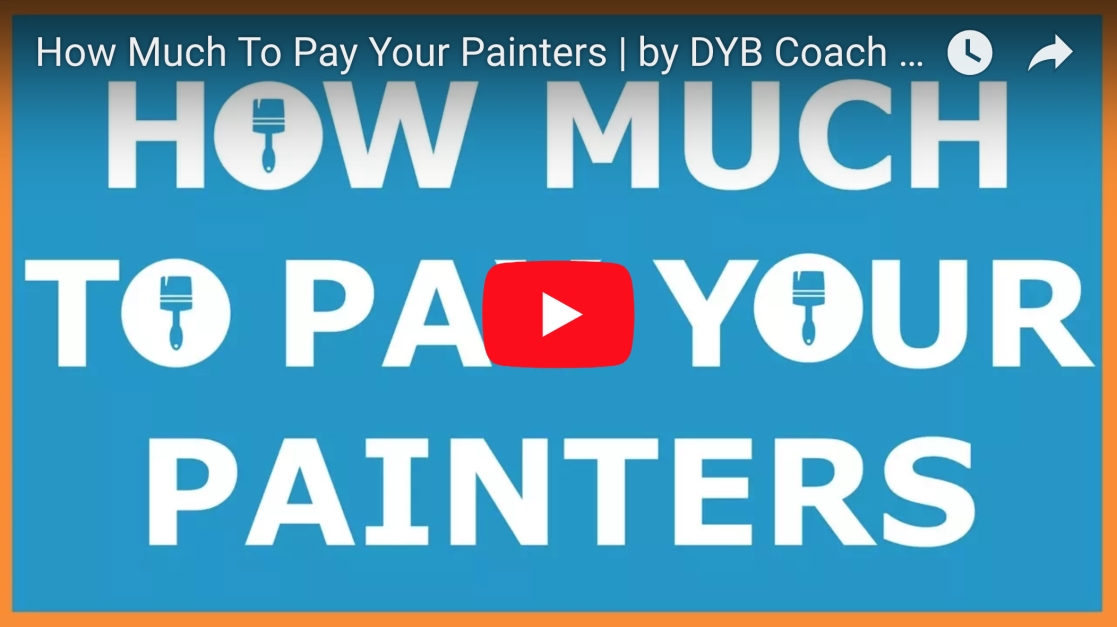
Shhhh… I am going to tell you a secret, but don’t tell anybody else!
I want to talk about employee compensation, and how we do it.
I am Ron Ramsden, a painting contractor up here in northern Massachusetts.
Employee compensation…
I know a big secret in our industry and I want to tell you a little story.
I pride myself on one thing in 18 years: I’ve never missed a payday, and we pay every single week.
But I am not going to say that I got paid every week.
Many times, everybody else got paid, I didn’t get paid and I thought to myself, “I’ll just double up the next week.”
Download Your FREE Checklist...
11 Interview Questions For Hiring All-Stars, E-mailed to you NOW!

Well, it seems like a volunteer job after a while.
Employees were always getting paid, I wasn’t always getting paid and it just wasn’t working.
I had to change a few things, so these are the things I changed for me and my company and it changed the whole path and trajectory of our company.
I want to share this first before we get to employee compensation.
Now, I always pay myself first. I have a set salary I pay myself.
It doesn’t matter if I work 40 hours or 60 hours. I’ve got a flat salary.
I am no longer in the field of moving a brush, in fact, I probably own one brush in my workshop that is mine and it probably doesn’t look very good right now.
So, I make sure I pay myself first.
Also, this is something I didn’t do before: I always take a booking deposit.
If I am going to book an exterior four or five months ahead of time, I require a $500 deposit.
This solidifies the contract and it also makes sure they save their time on the schedule.
I save it for them and they save that time for me.
It keeps the cash flow coming in and that’s one thing you want to do: you want to make sure there’s cash flow.
Also, use contracts. We require signed contracts using estimate rocket.
As we’ve talked about it before, it’s a very simple, low-cost estimating software where you can enter in your deposits, you can enter in your payment processes, everything is set right there.
So, it’s no longer just selling the contract and then asking, “Hey, can I have a third? Can I have a quarter of it? Can I have $2,000?”
It’s all set in writing with progress payments that have to be made.
Remember, the deposit is for commitment.
If they don’t want to commit to what they’ve said, it’s likely you will be scrambling to find work for your guys for that week when it comes up.
If you’ve ever been there – that is much harder than requiring a deposit.
It’s your job to keep the calendar full and your crews working.
Don’t get stuck again with no work because you were afraid to ask for a deposit.
Then, just simply and kindly explain that to anyone who balks at giving you a deposit.
They most often just need to be educated in a kind manner.
Also, I keep my pay consistent.
It’s the same pay throughout; then I can take bonuses when it’s the right time to take a bonus.
Sometimes there’s great cash flow, net profits are up, and I talk to my accountant on a monthly basis. We go over our numbers and we know our numbers. That’s very important.
Also a drip… what is a drip?
A drip is an amount of money that comes out of your business checking account automatically and goes into a savings account.
Some of us have 2, 3, 4, 5 drips, depending on what you are using your drip for. It could be as low as 5 dollars a week, it could be 5 thousand dollars a week.
This will go into a separate account for funding.
It might be a new truck fund, it might be a tax fund because you have quarterly taxes and you never want to get caught with not enough money to pay Uncle Sam!
His penalties and interest will bury you in a short period of time.
So, we might have a drip for our taxes and that money is going to be used when it is needed.
This is not going to be for everyday expenses.
This is a great thing to use in your personal life, too.
Maybe it’s a vacation fund; maybe it only has $50 in it right now – that’s okay! Let it drip.
Then you won’t feel the bite –or worse–go into debt, to go on vacation!
Most banks do online banking; you can do automatic savings like this. They call them transfers and you set up recurring transfers.
They can be to different institutions, too.
We call them drips because it drips…drips…drips…like a leaky faucet. You don’t notice it much, but it adds up fast!
It drips and before you know it, there is a nice little stash of money there.
You have to know your expenses. Do you know how much your cell phone costs, your insurance cost, your truck payments, etc are each month?
Add all of those up. You have to know your expenses.
So, we have the drip; we have the expenses.
We’ll get into the compensation and what we pay, but we also want to make sure that we know our benefits and what benefits cost us.
For our employees, we have sick pay, vacation pay, a 401K, holiday pay, and we also have a uniform expense allowance.
So, those things you have to also keep track of how much that’s going to cost you.
Now, for hourly costs…we currently use TSheets.
TSheets is our punch in, punch out software. We use it on our cell phones.
It’s very low cost, free for one user even.
TSheets helps us with our job costing. It also allows us to figure out earned time.
Infact, TSheets saved me $12,500 during lunch, once!
For every hour they work, they earn so much of the earned time which could be used for vacation time, holiday pay, or sick time.
Depending on how many years that they have been with us, the hourly rate that they earn, earned time is a different rate.
But let’s get to compensation… because this is the big, BIG secret.
I am going to show what I pay, which is probably average in my area of northern Massachusetts, on the New Hampshire border.
Let’s start with apprentice compensation. An apprentice to us is someone who just came to us with no experience.
Maybe he came from a vocational school, maybe he came from, job core, maybe he came off the streets, answered one of our ads, is a referral from one of our painters, but he really has no formal knowledge or skills as a painter.
We are willing to train them. For us, these are like putty in our hands, if they have good character and are willing to learn.
That’s what makes a great apprentice.
We could have an apprentice being an apprentice for two years.
We could have an apprentice to be there for five years, depending on how they grow and some people are just happy where they are, so I just want to share what we are paying right now.
An apprentice is making between $12 and $14 an hour.
After they are with us for three months, they start earning some earned time.
I know some people give earned time starting at 6 months; we like to give it starting at 3 months because then they can see something building up, there’s a little more value for them and that’s also factored into our hourly rate anyway.
So then we have our painters. A regular painter who’s gone through the apprentice or came to us with some skill is making between $15 and $20 an hour.
Remember, what you are paying will depend on your area, but this is what works in our area, at this point.
Now we have our leads. Our lead painters are helping the other painters.
They are helping out on the job, they are positioning people where they should be; they need no supervision whatsoever.
Lead painters are making between $18 and $22 an hour.
Next, we have our crew leaders. Crew leaders run the entire job.
The crew leader walks in with his iPad, which is loaded up with his project software, Basecamp 2, meets the homeowner at the designated time and does a quick walkthrough.
The paint needed for the project is already in the truck, might have to run out a little bit later to get some custom color or some add-ons, but he sets up and runs the whole job.
Just for an example, I actually stopped in around 2’0 clock in the afternoon on a job and met the realtor there who was going through with the crew leader.
Between the crew leader and I, we added about $12,000 to the job.
This crew leader is actually getting a 10% additional work order bonus on that, so that was something we also give our crew leaders, but crew leaders right now are making between $ 22, if they are a brand new crew leader, to $27 an hour.
So, our crew leaders can get an additional work order bonus because they are running the entire project.
Everything is on our crew leader from taking the testimonial video to making sure the homeowners are super, super happy, to making sure everything clicks on the job.
He also gets a company truck he can take home, we don’t encourage him to drive around but I know now and then something has to happen.
He gets a gas card and he gets additional work orders.
Our team also gets vacation pay and holiday pay, which is the earned time we spoke of earlier.
We switched over to earn time and set a straight holiday pay last year.
It allows them to use it as they earn it, just in case they have something going on and they need a couple of days off. So that’s a big bonus for us.
Apprentices get paid $12 to $14 an hour,
Painters get $15 to $20 an hour,
Lead Painters get $18 to $23 an hour,
Crew Leaders are at $22 to $27.
with the perks that some of the other guys don’t get that we mentioned before: bonus on the additional work orders, the truck, gas card, things like that.
They all get the other perks for earned time and uniform allowance and sick time that they can use as they earn it.
Make sure you read The New Mindset for Hiring Painters
